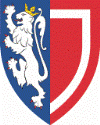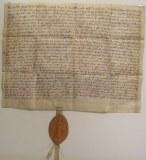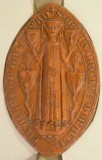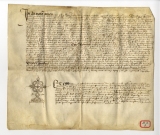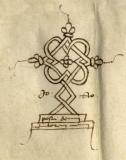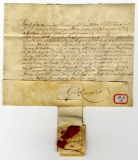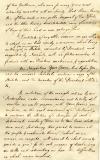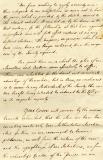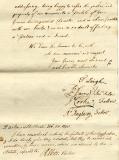Balliol College Archives & Manuscripts |
Bishop Fox's Statues 1507: a Quincentenary Exhibition
Introduction
Almost exactly five hundred years ago, Richard Fox Bishop of Winchester, acting as a Papal Commissioner, promulgated radically revised and simplified Statutes for Balliol. These Statutes regulated the College until the University-wide reforms of the mid-nineteenth century. Fox’s most fundamental revision was to sweep away a muddled arrangement for visitatorial supervision and give the College the unique privilege, which we still have, of freely electing a single Visitor. This was a crucial feature of the College’s subsequent fortunes. Visitors chosen by the College itself helped it to recover from the brink of bankruptcy and collapse twice around 1670 and 1790, and encouraged its transformation from an unambitious nepotistic club into an academic meritocracy between 1800 and 1850.
For those unfamiliar with the terminology, the Visitor is the ultimate authority and counsel in the College’s hierarchy, and has the last word on anything to do with the Statutes. The present Visitor, who was elected in 1986, is the Rt. Hon. Lord Bingham of Cornhill KG PC. The Statutes are regulations for every aspect of college life, which have the force of law. They have been modified many times following Acts of Parliament, or by the College itself with the approval of the University and Privy Council. The present updated Statutes are available on the main College website here.
For background, see the current College History [1] and sources there cited; see especially Balliofergus [2] and Paravicini [3] on the early Statutes and the promulgation of Fox’s Statutes; and Jones [4] on the introduction of competitive elections. Paravicini also gives transcripts and translations of some relevant early documents; Salter [5] gives transcripts of many. Transcripts are also found of all early Statutes and subsequent Decrees in a printing for the Royal Commission, 1853 [6].
This exhibition was on display to all members of Balliol past and present, and interested others, in lecture Room XXIII Monday - Saturday 18-23 June 2007, coinciding with the Summer Gaudy on the final day.
The Exhibition
For all items below, click on the thumbnail image to see a larger version. Images are large and may take some time to load.
1. Dervorguilla’s Statutes, 1282
The Statutes given by Dervorguilla of Galloway, widow of John Balliol and joint Founder of the College, survive intact, with her seal attached. It is a beautiful and evocative document. But it does not cover all aspects of collegiate life or succession, and visitatorial authority is divided between two Procuratores.
Archive ref: D.4.1. Transcription: Salter. Translation: Jones p.318.
2. Sir Philip Somerville’s Statutes, 1340
Sir Philip Somerville’s benefactions were generous, but the new Statutes which he also gave complicated matters by, inter alia, increasing the number of people involved in visitatorial supervision, with the Bishop of Durham having the ultimate authority, which widened the scope for disagreement.
D.7.5. Transcription: Balliofergus p.40. Translation: Paravicini p.184
3. Statutory changes made by Bishops of London 1363, 1433 and 1470
Somerville’s Statutes led to confusion and discord, and in 1363 an approach to Rome resulted in a commission addressed to Simon Sudbury Bishop of London to revise the Statutes again. His revisions do not survive in our Archives, but it can be deduced that the Bishop of London was given the last visitatorial word because in the following century his two successors Robert Fitzhugh and Thomas Kempe made further amendments.
The documents exhibited concern the 1433 modification. The first document is a letter from the College Rectores (= the Procuratores of earlier times) to Fitzhugh, Richard Rotherham and John Frekyngtone about the need for a change; it is authenticated with the seal of the Chancellor of the University. The second document is the Bishop’s decree of amendment, with his seal.
Archive ref: D.6.11 & D.6.11* (formerly D.4.10). Transcriptions: Salter 575 & 576
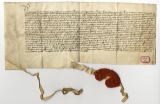
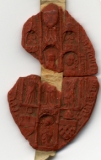
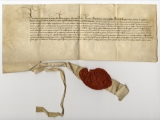
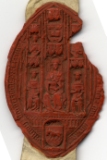
4. Papal Commissions, 1503-1504
All the efforts of the previous two centuries still left the College in a constitutional mess, and it petitioned Rome again for a solution in 1503. Pope Alexander issued a Commission for reform. He died soon afterwards and a fresh Commission was sent by Pope Julius II in 1504. Pope Julius’s original letter was seized by the King, along with other Papal documents, following the split from Rome, probably in 1534. Light symbolic deletions of Papal documents and allusions made at this time are found throughout the mediaeval Archives. The King’s attempt to remove evidence of Papal authority failed, however, because a wily Fellow made a copy of Pope Julius’s letter; having made a copy he immediately crossed it out as a defence in case he was discovered. The Commission to revise the Statutes was addressed to the Bishops of Carlisle and Winchester, but it was taken up alone by Richard Fox, one of the great Bishops of Winchester.
Archive ref: First Latin Register, p.31. Translation: Paravicini p.238
5. Richard Fox
A copy of the portrait of Richard Fox (1448-1528) which hangs in the Hall of Corpus Christi College, whose Founder he was in 1515, is exhibited by kind permission of the President and Fellows. The original, on panel, by Joannes Corvus was painted about 1520, by which time Fox was blind. He was Bishop of Winchester from 1501 until his death.
The portrait was reproduced for the exhibition by the kind permission of the President and Fellows of Corpus Christi College, Oxford. An image of it can be seen here on the public essays area of the Oxford Dictionary of National Biography.
6. Bishop Fox issues new Statutes 1507
When Fox’s Statutes were ready, he asked John Claymond, later first President of Fox’s Oxford foundation Corpus Christi College, to take oaths from the Fellows of Balliol to observe them.
D.6.15 D.6.16
Transcriptions: Salter 580 & 581
7. Statute Books, 16 th-19 th centuries
At least eight manuscript copies of Fox’s Statutes survive in various collections. The one exhibited was made when the Statutes came into force; the Statutes are followed by a notary’s certificate of authenticity and copies of subsequent Visitor’s decrees etc. The later entries are in the hands of various Masters and Fellows, often with signatures, and the volume is given additional character by the fact that the childish signatures of several of the children of the Master Edmund Lilly are found inside the front cover (e.g. “John Lillie 1590 January 17 natus”).
The volume is open at pages which show the notarial certificate on the left, with a subsequent addition of 1571 concerning Commoners which is signed by the Visitor, the Master Adam Squire and a number of Fellows including Robert Persons. Also exhibited are copies of the sections of the Statutes concerning Fellows and the Visitor.
Statutes 1, fo
Statutes 1, copy fo.22
Translation by Guy Westwood
Statutes 1, fo
Translation by Guy Westwood
Statutes 1, photograph of inside front cover
8. Bishop Fox acts as Visitor himself, admitting Thomas Cisson Master, 1511
Fox acted as Visitor himself to begin with, for example admitting Thomas Cisson as Master in 1511. Cisson is in fact the earliest Master to whom an exact date of admission can be ascribed. The document exhibited is a notarial record that everything has been done by the book.
Archives ref: D.3.3
9. Royal Charter, 1588
The College acquired more of a reputation for adherence to Rome than was good for it during and after the Reformation, and it felt seriously insecure by the 1580s because its corporate independence and very existence could be held to depend ultimately on Papal authority. So in 1588 it petitioned for, and obtained at considerable expense, the Royal Charter which is displayed. It defines our corporate style and is still valid, but because it was never needed its significance was forgotten. It was rediscovered in a broom cupboard 25 years ago and has been conserved and magnificently mounted with the generous help of an anonymous Benefactor.
Archives ref: F.11.6
Transcription of Latin text by Anna Sander
English translation by Guy Westwood
10. The Visitor appoints Thomas Good Master, 1672
Balliol’s finances suffered badly through loss of agricultural rents during the English Civil War and forced “loans” (which have never been repaid) to the King. After the War, misfortune was compounded by mismanagement and minor corruption, and the College came close to collapse. The Visitor, Thomas Barlow, actually visited and took control, ordering a general shake-up. Although the Master Henry Savage was admonished and fined, he was not deprived, but when he died the Visitor used his authority to ensure that Thomas Good took over as Master. Good, a former Fellow and moderate Puritan, set about fund-raising, which was continued by his successors with the help of successive Visitors, and restored the College to modest solvency.
D.3.16
11. The Visitor leaves Essex livings to the College, 1713
The College always had some ecclesiastical patronage, which was effectively part of the Fellowship remuneration package because it enabled Fellows to leave and take a parish when they wanted to marry; Fellows had to be celibate priests, and most would have been looking to settle into family life eventually. But the College’s patronage was insufficient for the need, and this was partly rectified by the bequest of three Essex livings by the Visitor Henry Compton, who with his successor as Visitor and Bishop of London John Robinson appears in the Bidding Prayer: “Dr Henry Compton and Dr John Robinson, successive Bishops of London”. Advowsons (ecclesiastical patronage) were valuable saleable assets, as the individual appointed to a living became entitled to the associated income for life. So the bequest was a generous one, which helped to make Balliol Fellowships more attractive.
The document exhibited is the conveyance of the advowsons to the College by Hatton Compton, son and Executor of Henry Compton.
C.23.17
12. The Visitor approves the suspension of a Fellowship, 1775 and 1802
Although the college had recovered from the financial problems of the seventeenth century by 1725, in the mid-eighteenth things deteriorated, mainly because admissions fell to an all-time low. By the last quarter of that century it was on the brink of bankruptcy again, and a Fellowship was frozen in 1775 so that the emoluments which would have been paid to a Fellow went to help with the College’s debts. The freeze was further approved in 1802. This was strictly contrary to the Statutes and could not have been done without the support of Visitors Robert Hay Drummond and John Moore. Fortunately at about the same time the College had some good luck in the form of coal rights from its agricultural land in Northumberland. The suppression of Fellowships, coal, and good management by John Davey and John Parsons (both of whom served as both Bursar and Master) saved the College and set it up for the rise which began about 1800.
The papers of 1775 and 1802 are exhibited as wrapped and placed in the Archives with wrapper annotations by John Davey and John Parsons respectively.
Archive ref: D.9.1
D.9.5
13. The Visitor upholds a disputed Fellowship election, 1807
Elections to Fellowships under Fox’s Statutes were far from open competitions. Scholars of the College had a statutory advantage, and the Scholars themselves were only technically elected by the College. In fact Scholars were appointed by individual Fellows, who each had a Scholarship place in his personal gift, and it was common for their nephews or the sons of friends to be favoured. There were several disputes about the extent to which Scholars should be advantaged, but in 1807 the Visitor Shute Barrington settled the matter for ever, by upholding, in resounding terms, the election, on the basis of merit competitively established, of an outsider William Vaux to a Fellowship, despite the protests of a sitting Scholar.
Barrington ’s Decree is exhibited with the cover (signed and sealed by him) in which he sent it, and its original archive wrapper.
D.9.7
14. The Visitor approves the opening of Domus Scholarships, 1834
In 1827 the Fellows, most of whom had themselves been elected as such on merit, decided to waive their individual rights of appointing Scholars and award Scholarships by competitive examination. This move, which was later approved by the Visitor William Howley (thus making it a permanent change), was by common consent the making of modern Balliol.
The relevant entry in the College’s First English Register is shown (in the hand of Charles Atmore Ogilvie, Senior Fellow and leading light in the matter) together with an additional Statute written out by Richard Jenkyns the Master, signed by all Fellows, and approved by the Visitor. With the Statute is exhibited the postal (pre-stamp) cover in which it was returned by the Visitor.
D.9.8
English Register fo.61
15. The Royal Commission admires the College, 1853
When Parliament decided that widespread reform was necessary in Oxford, the Royal Commission 8 found much to admire in Balliol and held its openness up as a model for others.
Report of the Commissioners, p.
Acknowledgements
We are grateful to Julian Reid of Corpus Christi College, Oxford, Archives; Simon Bailey of Oxford University Archives; Adrian James of the Society of Antiquaries, London; and Suzanne Foster of Winchester College Archives.
References
- J Jones, Balliol College. A History. 2 nd edn. revised
- H Savage, Balliofergus, 16
- F de Paravicini, Early History of Balliol College
- J Jones “Sound Religion and Useful Learning: the Rise of Balliol under John Parsons and Richard Jenkyns 1798-1854”, chapter 5 in Balliol Studies, ed. JM Prest, 19??
- HE Salter, Oxford Balliol Deeds, 1913
- Statutes of the Colleges of Oxford …. : Balliol College . Printed by desire of Her Majesty’s Commissioners, 1853.
- R. Poole (“Mrs RL Poole”), Catalogue of the Portraits in the Possession of the University, Colleges, City and County of Oxford, volume II part I, 1925, p.261.
- Royal Commission Report
Biographical notes
The cryptic characterisations apply at the date of appearance in this Guide. Many of the men listed have an Oxford Dictionary of National Biography entry; if you are viewing from the Oxford network or have another ODNB subscription, you can follow the hyperlinked titles to the relevant entries.
Bishop of Lincoln and Visitor, d. 1691 |
|
Bishop of Durham and Visitor, d. 1826 |
|
Cisson, Thomas |
Master, d. by March 1543 |
President of Magdalen, d. 1536 |
|
Bishop of London and Visitor, d. 1713 |
|
Davey, John |
Master, d. 1798 |
Archbishop of York and Visitor, d. 1776 |
|
Bishop of London, d. 1436 |
|
Frekyngtone, John |
Rector, a Franciscan |
Master, d. 1678 |
|
Archbishop of Canterbury and Visitor, d. 1848 |
|
Master, d. 1854 |
|
Kempe, Thomas |
Bishop of London, d. 1488 |
Lilly, Edmund |
Master, d. 1610 |
Archbishop of Canterbury and Visitor, d. 1805 |
|
Senior Fellow, d. |
|
Master, d. 1819 |
|
|
|
Bishop of London and Visitor, d. 1723 |
|
Rotherham, Richard |
Rector (formerly Master), d. 1455 |
Master, d. 1672 |
|
Somerville, Philip |
Benefactor, d. 1355 |
Squire, Adam |
|
Bishop of London, d. 1381 |
You do not need to request permission to download or print one copy of any of the images on these pages for your personal private study or research purposes.
You do need to request permission in writing to use any of these images for any publication in any format, including any use on a website.
There is no charge for Archive enquiries, but donations for Archive purposes are always appreciated.
| Updated 11.viii.14
|
Balliol College All rights reserved © 2026 |
